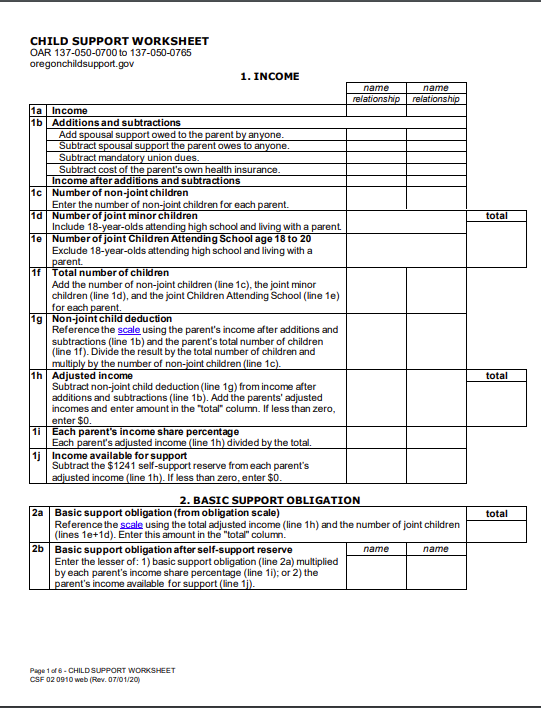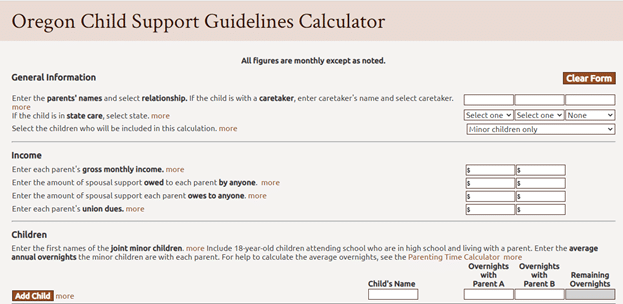
Everything you need to know about Oregon child support laws, updated for 2020.
Oregon Child Support Guidelines define upkeep as money caregivers or sometimes the state pays to meet the needs of a child.
Traditionally, the non-custodial parent pays upkeep because the courts assume that the custodial parent spends his/her share directly on the child. However, in Oregon the law allows parents to agree on upkeep amount informally, and thus the law steps in when you fail to find common ground.
So, we must ask, how is the upkeep amount set under Oregon child support guidelines? What do I do if the obligated party refuses to pay?
Below, we explore all the main aspects of child support in Oregon plus list actionable tips!
How to apply for child support in Oregon
The Oregon Department of Justice offers Support services including, child support application, paternity establishment, support order establishment and enforcement, child support collection, and all related services.
To apply for services, you must register your details here. Or find a support office in your area on the map below.
After you create your online account, a case manager will contact you and guide you through the additional steps based on your family’s needs.
If you need more help, call 800-850-0228 or email [email protected].
what to remember:
- To apply, you must create an online account at the DOJ’s website, then complete the child support application (CFS 03 0574) form.
- Applicants must pay a one-time $1 fee for services.
- You can only access paternity services after creating an account.
- The DOJ may close your case if its representatives cannot contact you after application.
- Parents who have never received TANF must pay an annual $35 service fee.
How is paternity established in Oregon?
When a child is born to a married couple in Oregon, the law presumes that the man is the father. The same is true when a child is born 300 days after a divorce, legal separation, annulment, or termination of a marriage by death.
What makes paternity establishment in Oregon important is that it grants the father the right to visit or seek custody of the child, the child gets inheritance rights, and the custodial parent gains the right to seek birth cost reimbursement or support from the date of the child’s birth.
what to remember:
- If unmarried, both parents may sign a “Voluntary Acknowledgement” of paternity form at the hospital.
- Parents can sign the notarized version of the voluntary acknowledgment of paternity forms at any time for $35.
- Either parent can petition the court through an attorney for a paternity test.
- You must pay child support even if you reside out of state.
- Genetic test results are usually available within 15 to 30 days.
How to determine child support in Oregon
OAR 137-050-0700 to OAR 137-050-07655 contains Oregon’s child support disbursement formula. The formula works under the presumption that quote;
“It is rebuttably presumed that an obligated parent is able to pay at least $100 per month as child support. if an obligated parent’s total support is less than $100, increase child support by the amount needed for total support to equal $100. For purposes of this rule total support equals cash child support plus the greater cash medical support or the total out-of-pocket cost of health coverage the parent is ordered to provide pursuant to OAR 137-050-0750.”
However, the presumption does not apply if the parent receives public benefits, is incarcerated, disabled, or if the parent has exactly 182.5 annual average overnights.
How to calculate child support in Oregon
In Oregon, parents can calculate their monthly obligation in two ways. One is using the state’s official child support calculator. And two is through court worksheets.
However, I must mention that the resulting figure may be very different from what the judge orders because the judge’s priority is the best interests of the child. What that means is if the resulting figure is unfair to the child, then the judge will deviate from Oregon child support guidelines.
When does deviation from Oregon child support guidelines happen?
Some reasons the judge may choose not to follow Oregon child support guidelines are:
- Caregivers experiencing involuntary financial hardship, for example, involuntary unemployment or incarceration.
- The growing or special needs of a child may prompt the judge to deviate.
- Extraordinary expenses incurred by either parent.
The list above is not complete, so contact a family court attorney in your area for better insight.
Dumbed down, to estimate your support order, you must:
- Download and complete CSF 02 0910 Child support worksheet plus worksheet instructions CSF 0910I. (See the snippet below).

image 1: page 1 Oregon child support worksheet.

Oregon child support guidelines calculator.
To calculate parenting time, use Oregon’s parenting time calculator here.
How to modify child support in Oregon
Oregon Child Support Guidelines allow parents to petition for child support modification 35 months after the court established or reviewed the order. The basic requirement for a modification is “a substantial and continuing change” in the parent’s finances. For example, if your former partner secures a better paying job and the needs of the child have changed, you can petition for modification.
You can also petition for modification if you lose your job involuntarily, if the number of children receiving support changes, when the needs of the child change, and or when physical custody changes.
How does child support modification work in Oregon?
- The petitioning parent submits a written request to modify a child support order.
- After reviewing the petition, the Oregon Child Support program notifies the other parent.
- Depending on the nature of your request, the court may request a hearing, or approve the petition if both parties agree.
To begin your petition, download and complete the “Request for Review Modification, change of custody, credit on arrears or termination” form here.
you may also access all related forms here.
what to remember:
- If you experience a “substantial change of financial circumstances”, you can petition for modification before the 35 months waiting period is up.
- When one parent lives outside Oregon, federal law determines which state is responsible for modification (visit local support offices).
- The support number for child support modification is 800-850-0228.
What happens if you do not pay child support in Oregon?
As mentioned, most parents in Oregon enter child support agreements voluntarily. But a voluntary agreement does not guarantee payments. That is why the Oregon Department of Justice has several tools it uses to force parents to pay. These enforcement tools, according to the DOJ, include:
- The DOJ can intercept the payor’s state or federal tax returns.
- Oregon’s justice department may place a lien on any property a delinquent parent owns in the state preventing sale until the parent honors all past-due support payments.
- Income garnishment: the DOJ can collect child support directly from the non-custodial parent’s bank account, lottery winnings, inheritance, wages, salary, and so on.
- license suspension: the DOJ may also suspend the payors’ drivers, recreational or business license through other state agencies including the DMV.
Other enforcement options:
- credit bureau reporting.
- passport suspension.
- garnishment of personal injury settlements.
How to enforce contempt of court charges in Oregon
“contempt of court” refers to a situation where a parent willfully and knowingly disobeys a court order. For example, when your partner refuses to pay upkeep.
Question is, how do you enforce contempt in Oregon?
The punishment for contempt includes the ones listed above but depending on the nature of the crime. The accused stands to face jail time or a fine. To elaborate we must look at criminal non-support in Oregon.
What is criminal nonsupport in Oregon?
ORS 163.555 Criminal Nonsupport defines nonsupport as, quote,
“A person commits the crime of criminal nonsupport if, being the parent, lawful guardian or other-person lawfully charged with the support of a child under 18 years of age, born in or out of wedlock, the person knowingly fails to provide support for such child.”
What is crucial to remember is that criminal non-support is a class C felony in Oregon and the punishment for said crime is a maximum of five years in prison or a $125,000 fine. In some cases, the judge may order both depending on the number of violations. That means the more you fail to provide support, the higher the risk of receiving the maximum sentence or a judgment close to it.
Overall, jail or prison time is usually the court’s last course of action because it hinders your ability to work and pay. Thus, you can prevent most enforcement actions by paying your parental obligation.
Also, if your support order is putting undue stress on you and your family, you can keep matters from escalating by requesting a modification.
When can I stop paying child support in Oregon?
According to Oregon Child Support Guidelines, your support order terminates when the child reaches 18. Regardless, your order may continue until the child is 21 if he or she qualifies as a “child attending school”.
For parents who made agreements out of court, your obligation will end after you meet all terms and conditions laid out. For example, if you agreed to provide college or university tuition, your order ends when the child completes his/her education.
It is also true that support may continue indefinitely if the child or young adult is physically or mentally disabled.
Voluntary termination of parental rights
Oregon child support guidelines identify only one scenario where a parent can voluntarily give up his/her rights towards a child. That is when a court finalizes an adoption case.
But, termination of parental rights does not wipe your child support debt. thus, you must pay what you owe. Also, the statute of limitations on child support in Oregon is 10 years after the last support payment.
Emancipation of minors in Oregon
If you are at least 16 years of age. Oregon child support guidelines offer you the option of emancipation.
Emancipation is a process that grants the child the rights of an adult such as the right to sign a lease, but emancipation does not overrule other laws such as the age of drinking.
The legal requirements for emancipation in Oregon are. one, parental consent. two, a financially independent, self-sufficient minor living separately from his/her parents. and three, the minor most demonstrate to the court that he or she can manage without parental assistance.
Consult with a family court attorney to see if you qualify for emancipation in Oregon.
More Oregon Laws